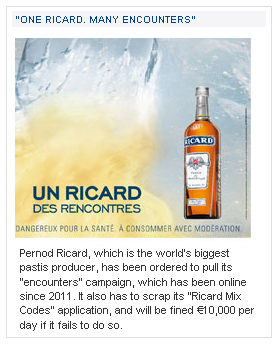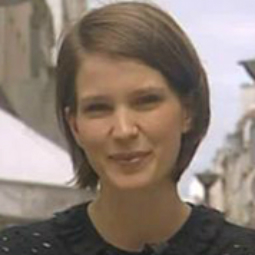French court bans Ricard Facebook campaign in judicial first

Alcohol brands better get used to the idea of a future without Facebook in France. The country’s highest court ruled this month that an app by Pernod Ricard promoting the brand as a cocktail base had no place on the social network, in the first decision of its kind.
Judges from the Cour de Cassation ruled that the smartphone application, which allowed users to post a cocktail recipe directly to their walls with the message “You can get Ricard Mix recipes too on the Ricard Mix Codes app,” was ‘inopportune’.
They considered Facebook users logging on to find an advertisement from a friend would 1) Not recognise it as an advert because it was posted by someone they trust; 2) Be an unsuspecting recipient of advertising because all they thought they would find on Facebook was the usual fare you get on Facebook (boastful statements, endless photos of a pug/newborn baby/ holiday in Ibiza etc. etc.).
It’s not massively surprising that the July 3 ruling has gone unnoticed in France. The powers that be have a history of wrapping their public in cotton wool when it comes to advertising. What might be considered patronising and unnecessary in other countries is deemed basic protection here.
The most obvious example is television advertising, which has to be clearly labelled as such, meaning that each time programming cuts to a commercial break, an “advertising” jingle is played. Just in case you thought you were watching a one-minute “documentary” about why driving a BMW makes you feel like a real man… followed by a very short film about a really fascinating cleaning product.
I think it’s fair to say this attitude – which, strangely, hails back to the days when advertising was so forthright it would seem entirely unnecessary – is pretty outdated. Especially in a case when teenagers are the concern – which is what the judges insisted was their priority in their verdict against Pernod Ricard.
 The worry for advertising standard regulators – not only in France but elsewhere in Europe – is that minors are being exposed via social media to a lot of the “adult” advertising they spent decades shifting off daytime TV and billboards.
The worry for advertising standard regulators – not only in France but elsewhere in Europe – is that minors are being exposed via social media to a lot of the “adult” advertising they spent decades shifting off daytime TV and billboards.
It also comes at a time when France is facing a teen “binge-drinking” crisis they previously thought confined to the loutish shores of the UK and Scandinavia.
But instead of orchestrating a clever blow to the creeping alcohol culture online and in reality, the court cronies have only embarrassed themselves by showing how little they know both about Facebook and binge-drinking.
Firstly, this campaign is unlikely to appeal to young people. While some cigarette and alcohol adverts make smoking and drinking look cool to the under-18s, this one certainly does not.
True – teenagers who are bent on getting drunk would probably not turn down a bottle of Ricard. But I don’t think this particular ad is going to have them gagging for a sip of the aniseed liquor either, which is best known for lubricating the elderly residents of Marseille on the pétanque sidelines.
The slogan – “One Ricard. Many encounters” – is more likely to appeal to what I would have thought is its target audience: lonely single men with a shyness that is best cured by alcohol.
It’s called Dutch courage. It’s hardly revolutionary. But it’s not what 15-year-olds are seeking out on a Friday night. Minors are not looking “to make acquaintances,” they are surrounded by them. And neither are they much into making cocktails, which leads me on to my second point…
When it comes to “inopportune” advertising, the first people to know what is an advert and what is not an advert on Facebook are the same people who are apparently at risk here. It’s sweet of the wise old owls to think that French minors can’t tell the difference between a heartfelt status update and a clear case of publicity, but it’s absurdly naïve.
Young people will binge drink because their friends do, not because their uncle posted a pastis recipe on a social network. I should know – I come from the loutish shores where we started binge-drinking – long before Facebook even existed.




1 Comments
Post new comment